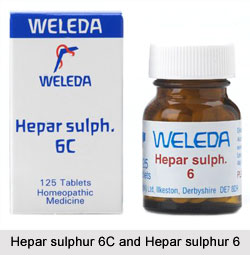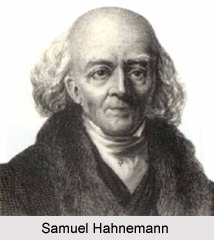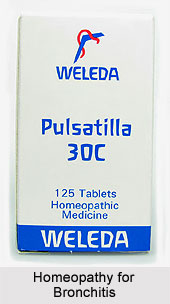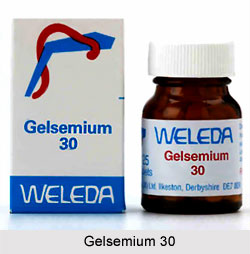 Tonsils are a pair of tiny almond-shaped mass of lymphatic tissue on both sides of the throat. These structures act as a defensive measure against infections (bacteria, viruses and allergen) that infect the body through the nose and mouth. Tonsils are an essential part of the body`s protective lymphatic system which discharges white blood cells that literally consume bacteria.
Tonsils are a pair of tiny almond-shaped mass of lymphatic tissue on both sides of the throat. These structures act as a defensive measure against infections (bacteria, viruses and allergen) that infect the body through the nose and mouth. Tonsils are an essential part of the body`s protective lymphatic system which discharges white blood cells that literally consume bacteria.
It has been an unsaid homeopathic rule to literally `save the tonsils` whenever possible. The treatment of enlarged tonsillitis with homeopathy has two stages in cases of long standing. In homeopathy, medicines for tonsillitis are normally selected with the mode of onset and temperament of the disease, stimulating cause, thirst, sweat, shivering, mental restlessness, characteristic symptoms of patient, appetite, sleep and stool habit.
The below mentioned homeopathic remedies have been found effective in many cases of tonsillitis, comprising:
Baryta Carbonica [Bar-c]
This mentioned remedy, Bartya Carbonica, has been ranked among the most prominent ones for acute tonsillitis. The medicine is especially of use when the trouble is in the parenchyma of the glands and suppuration hardly follows its use. It suits comparatively mild cases, patients who have had an attack from any exposure. Bartya Carbonica removes the predisposition to attack.
Baryta Carbonica is very useful in instances where every cold settles in the tonsils, especially in children who have a chronic enlargement of those glands. The chief use of this homeopathic medicine for tonsillitis has been, however in chronic enlargement of the tonsils and it undeniably has been very often erroneously prescribed, as it corresponds to comparatively few cases. Baryta Carnbonica has proved useful in tendencies towards scrofulous children with enlargement of other glands also being affected with tonsillitis.
Calcarea phosphorica [Calc-p]
In chronic enlargement of the tonsils in strumous children Calcerea phosphorica stands well in typical instances. The tonsils are flaccid and pale; there exists a chronic follicular inflammation and impaired hearing also. This homeopathic medicine`s efficacy for tonsillitis in adenoid hypertrophy examples, are well known and authenticated.
Calcarea iodata [Calc-i]
This homeopathic remedy is indeed of assistance in instances of enlargement of the tonsils, similar to Baryta. They are hard, red and nodular.
Bromine [Brom]
Bromine comes to effective use in cases of red inflamed tonsils, covered with a network of capillaries.
Lycopodium [Lyc]
 Lycopodium is efficient in chronic enlargement of the tonsils, which are embraced with small ulcers.
Lycopodium is efficient in chronic enlargement of the tonsils, which are embraced with small ulcers.
Ferrum phosphoricum [Ferr-p]
Chronic enlarged hyperaemic instance of tonsillitis, with smooth swelling makes this homeopathic medicine useful;
Belladonna [Bell]
Belladonna is esteemed as the chief homeopathic remedy for tonsillitis commencement, ff the case has passed the stage where Aconite or Ferrum phosphoricum would be designated. There exists redness and swelling and the deeper the redness and the more the swelling, there exists less chamnces that Belladonna would be recommended. At the commencement of an attack, it exceeds Apis in value, as Apis only necessitates the mucous surface. The neck is swollen and stiff from the outer side, ulcers form rapidly and the right side is worse. In acute instances of paroxysms of the chronic form, Belladonna is very useful.
Gelsemium is always advised in painful spots deep within the tonsil. This homeopathic medicine for tonsillitis is recommended when the affected area aches out of proportion on swallowing, red, inflamed throat, striking in the ear, with swift progress. The 2x measurement of Gelsemium will often abort, when in the chilled phase.
Amygdala Persica has dark injection of the fauces, incising pains and difficulty in swallowing.
Phytolacca
Phytolacca is recommended especially in the follicular form of tonsillitis, with pain at the root of the tongue or reaching the ears when swallowing. The affected parts generally turn dark blue; the tonsils are large and blue and there comes about intense dryness, smarting and burning sensation in the throat.
Ignatia
This homeopathic medicine for tonsillitis is almost specific in follicular instances. Small superficial yellowish white ulcers seek the usage of Ignatia. Symptoms like a feeling of a plug in the throat and worsening when not swallowing calls for its usage.
Guaiacum
Guaiacum is looked at as one of the most useful remedies at the commencement of an attack, especially of catarrhal tonsillitis. The characteristics comprise a violent burning sensation, headache, throat hot, chill and aching in back and limbs; abscesses also are formed quickly, which calls for usage of this homeopathic medicine for tonsillitis. In the 1x measurement which when frequently repeated, will often abort an onslaught of the trouble.
Hepar sulphur
Hepar sulphur is well advised where there exists piercing pain in the throat, splinter-like and much throbbing accompanied by rigours demonstrating that abscess is on the point of taking shape and it is desired to hasten it. The affected and swelled parts are extremely sensitive to touch. The tonsil pain is also known to shoot into the ears, when this medicine is counselled.
Silicea
Silicea is counselled in instances when the abscess has ruptured and refuses to heal, especially in rachitic children. Fistulous cases also call for this homeopathic treatment for tonsillitis.
Mercurius
Mercurius is rarely of service at the onset of tonsillitis, but comes to impressive use later in a more advanced stage when pus has formed already. Tonsillitis during which this remedy is recommended is accompanied by great swelling, the whole fauces has turned deep red, the tonsils darker than any other part, ulcers have formed form, salivating persists heavily and the breath is foul. As compared to Belladonna application of Mercurius is less painful, but the general health is quite worse. Biting pains and difficulty to breathe from the swelling can be treated with this medicine. Pseudo membraneous deposit on tonsils and pharynx can also be noticed prior to application of this remedy.
Apis mellifica [Apis]
The instance of Oedema in tonsillitis variation necessitates the utilisation of this remedy. Useful in the simple form and not in the parenchymatous form, the throat is swollen both inside and outside when Apis mellifica needs to be administered. However, after its administering, only the superficial tissues are involved and not the parenchyma, which calls for application of Belladonna. Numerous points of beginning follicular secretion can be witnessed when this homeopathic medicine is recommended.
Lachesis [Lach]
Lachesis is administered when the tonsillitis has turned dark in portions. Swelling is intensely great and there exists extreme tenderness in the throat, calling for this homeopathy. The left tonsil has tendencies to overlap to go to the right, with pain shooting into the ear when one attempts to swallow. Pain is further aggravated with swallowing of hot drinks. Lachesis is administered in the tonsillitis variation of Peri-tonsillar abscess. The remedy is also a very useful remedy for a severe form of rheumatic pain, following tonsillitis. Flwo of pus degenerates and becomes thin.
Kali muriaticum [Kali-m]
Kali muriaticum is an almost specific homeopathy for follicular tonsillitis. No remedial measure perhaps has given any patient such satisfaction as is performed by this said medication. The throat has a gray look together with white patches and spots, while this is advised. Kali muriaticum is an invaluable remedy in acute or chronic tonsillitis, along with gross swelling. The 6x measurement trituration is the most reliable preparation.
Aconite 30
This homeopathic medicine is useful in the symptoms like sudden or acute attack of tonsillitis from exposure to dry and cold air. Some other symptoms can be stated as dry, burning, constricted feeling in the throat, accompanied by violent cough inducing restlessness, anxiety and fear. The face and neck goes dry, red and hot and also unquenchable thirst for large quantities of cold water.




